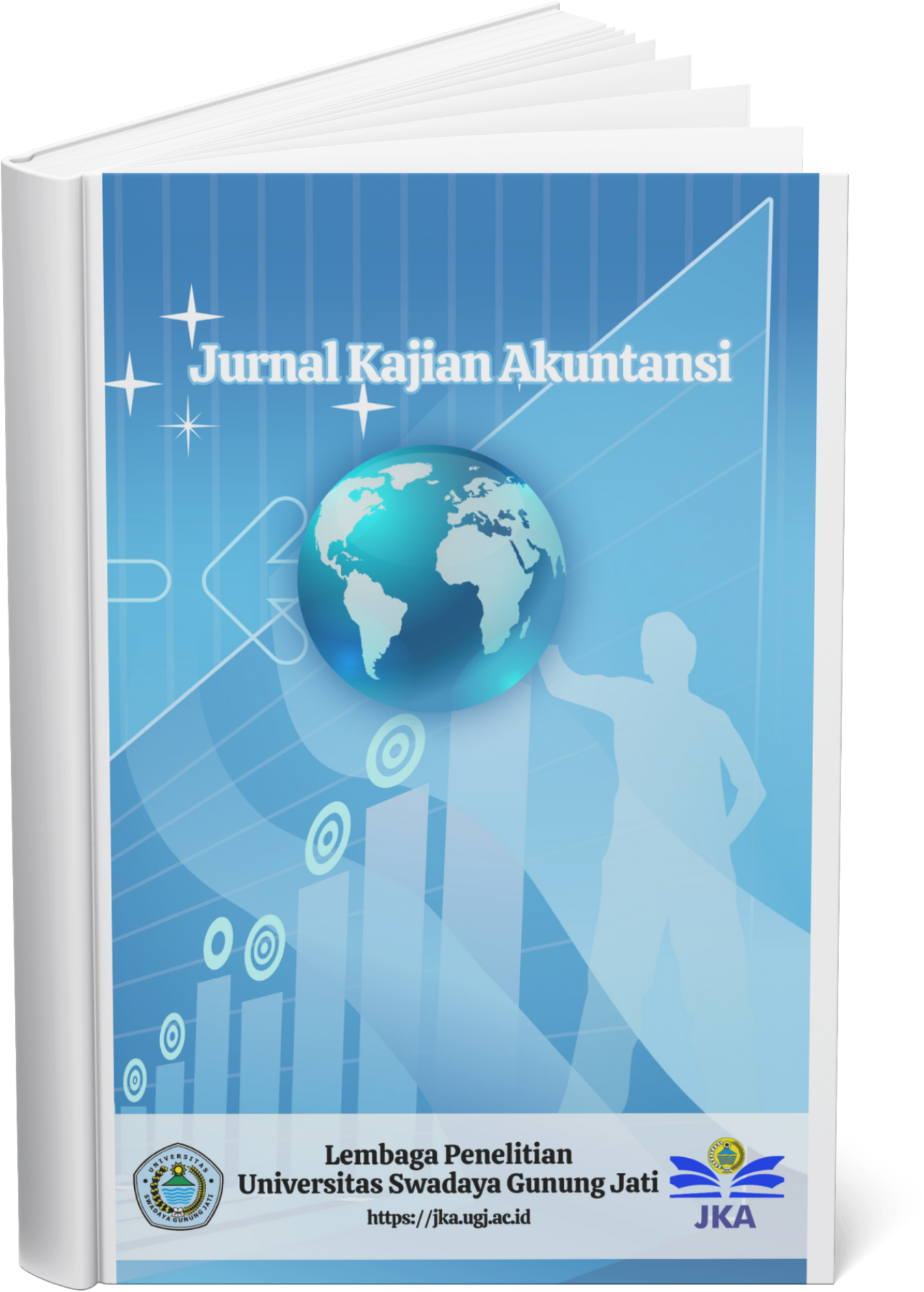Ethics, Behaviors, and Characters of Memayu Hayuning Bawono, Ambrasto Dur Hangkoro Accountant in Java
DOI:
https://doi.org/10.33603/jka.v5i2.5110Abstract
Abstract
The moral teachings and philosophy of life of the Javanese have a very deep meaning which leads to happiness. This paper aims to provide up-to-date knowledge about the meaning of Ethics, Behavior, and Character of Memayu Hayuning Bawono, Ambrasto dur Hangkoro in accounting profession education in Java, based on Javanese philosophy. This study uses a qualitative method approach, ethnography. The results of this study conclude that ethics, behavior, and character in accounting profession education based on Javanese philosophy are more “barès”, “ruruh”, “wantah”, “duga prayoga”, “nastiti” and do not focus on “ardana”. The character of "dhakah" in him slowly disappeared because the formed "warok" had reached "Wiloka". This finding provides a new aspect for the curriculum development of accounting education programs, so that graduates (accountants) can better understand and interpret the philosophy of human life from the point of view of Javanese philosophy.
Keywords: Ethics; Behavior; Accountant profession education character.
Abstrak
Ajaran moral dan filosofi hidup orang Jawa memiliki makna yang sangat mendalam
yang mengarah kepada kebahagiaan. Tulisan ini bertujuan untuk memberikan keterbaruan pengetahuan tentang makna Etika, Perilaku, dan Karakter Memayu Hayuning Bawono, Ambrasto dur Hangkoro pada pendidikan profesi akuntan di Jawa, berdasarkan filsafat Jawa. Penelitian ini menggunakan pendekatan metode kualitatif, etnografi. Hasil penelitian ini menyimpulkan bahwa etika, perilaku, dan karakter pada pendidikan profesi akuntan berlandaskan filsafat Jawa lebih “barès”, “ruruh”,“wantah”,“duga prayoga”,“nastiti”dan tidak berfokus pada “ardana”. Karakter “dhakah” dalam dirinya perlahan sirna karena “warok” yang terbentuk telah mencapai “Wiloka”. Temuan ini memberikan aspek baru bagi pengembangan kurikulum program pendidikan akuntansi, agar lulusannya (akuntan) lebih dapat mengerti dan memaknai filosofi hidup manusia dari sudut pandang filsafat Jawa.
References
Abdolmohammadi, M. J., & Baker, C. R. (2006). Accountants’ value preferences and moral reasoning. Journal of Business Ethics, 69(1), 11–25. https://doi.org/10.1007/s10551-006-9064-y
Bebbington, J., Gray, R., Thomson, I., & Walters, D. (1994). Accountants9 Attitudes and Environmentally-sensitive Accounting. Accounting and Business Research, 24(94), 109–120. https://doi.org/10.1080/00014788.1994.9729470
Bostan, I. (2011). Morality, Ethics and True Image in Business Accounting. Theoretical and Applied Economics, 18(6), 47–54.
Coffey, A. J. (1994). “Timing Is Everything”:Graudate Accountans, Time and Organizational Commitment. The ANNALS of the American Academy of Political and Social Science, 28(4), 943–956.
Evans, J., Huising, R., & Silbey, S. S. (2016). Accounting for accounts: Crafting ethnographic validity through team ethnography. Handbook of Qualitative Organizational Research: Innovative Pathways and Methods, 143–155. https://doi.org/10.4324/9781315849072
Heider, F. (1958). The Psychology of Interpersonal Relations. New York: Wiley.
Jackling, B., Cooper, B. J., Leung, P., & Dellaportas, S. (2007). Professional accounting bodies’ perceptions of ethical issues, causes of ethical failure and ethics education. Managerial Auditing Journal, 22(9), 928–944. https://doi.org/10.1108/02686900710829426
Jayanto, T. A. S. & P. Y. (2015). Analisis Faktor-Faktor Yang Berpengaruh Terhadap Audit Judgement. Accounting Analysis Journal, 4(4). https://doi.org/10.15294/aaj.v4i4.9114
Latan, H., Ringle, C. M., & Jabbour, C. J. C. (2018). Whistleblowing intentions among public accountants in indonesia: Testing for the moderation effects. Journal of Business Ethics, 152(2), 573–588. https://doi.org/10.1007/s10551-016-3318-0
Lubis, A. I. (2010). Akuntansi Keperilakuan (2nd ed.). Jakarta: Salemba Empat.
Luthans, F. (2008). Organizztional Behavior. New York: McGraw-Hill Companies,Inc.
M.J. Langeveld, dan F. Bacher, H. A. (1967). Paedagogica Europaea: the European yearbook of educational research (Council of Europe).
Magnis, F. S. (1987). Etika Dasar: Masalah-masalah Pokok Filsafat Moral. Yogyakarta, Indonesia: Kanisius.
Mardiwarsito, L. dan H. K. (2012). Struktur Bahasa Jawa Kuno. Depok: Komunitas.
Mehran, F. (2010). Abraham Maslow. Psychologie Positive et Personnalité, 33–41. https://doi.org/10.1016/b978-2-294-70491-8.00004-6
Moleong, L. J. (2011). Metodologi Penelitian Kualitatif Edisi Revisi. Bandung: PT. Remaja Rosdakarya.
P J, Z. (2005). Adiparwa Bahasa Jawa Kuno dan Indonesia. Surabaya: Paramitha.
Downloads
Published
How to Cite
Issue
Section
License
- Authors retain copyright and grant the journal right of first publication with the work simultaneously licensed under a Creative Commons Attribution-ShareAlike (CC-BY-SA 4.0) that allows others to share the work with an acknowledgment of the work's authorship and initial publication in this journal.
- Authors are able to enter into separate, additional contractual arrangements for the non-exclusive distribution of the journal's published version of the work (e.g., post it to an institutional repository or publish it in a book), with an acknowledgment of its initial publication in this journal.
- Authors are permitted and encouraged to post their work online (e.g., in institutional repositories or on their website) prior to and during the submission process, as it can lead to productive exchanges, as well as earlier and greater citation of published work.
